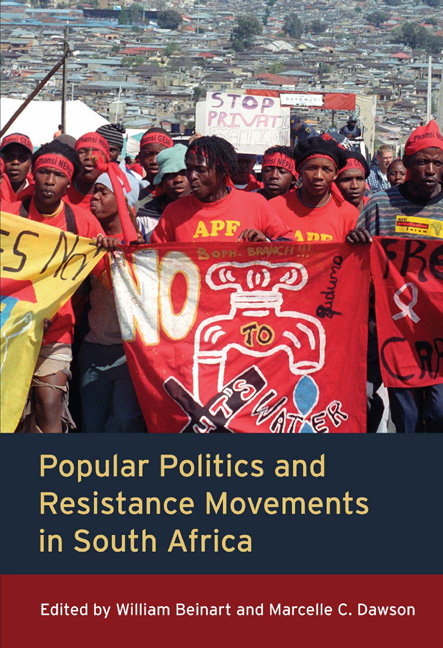Book contents
- Frontmatter
- Contents
- Contributors
- List of Abbreviations and Acronyms
- 1 Popular politics and resistance movements in South Africa, 1970–2008
- 2 The Durban strikes of 1973: Political identities and the management of protest
- 3 ‘There's more to it than slurp and burp’: The Fatti's & Moni's strike and the use of boycotts in mass resistance in Cape Town
- 4 The role of the African National Congress in popular protest during the township uprisings, 1984–1989
- 5 Strategies of struggle: The Nelson Mandela campaign
- 6 From removals to reform: Land struggles in Weenen in KwaZulu-Natal, South Africa
- 7 From popular resistance to populist politics in the Transkei
- 8 ‘It's a beautiful struggle’: Siyayinqoba/Beat it! and the HIV/AIDS treatment struggle on South African television
- 9 The Nelson Mandela Museum and the tyranny of political symbols
- 10 Black nurses’ strikes at Baragwanath Hospital, Soweto, 1948–2007
- 11 The ‘New Struggle’: Resources, networks and the formation of the Treatment Action Campaign (TAC) 1994–1998
- 12 New social movements as civil society: The case of past and present Soweto
- 13 ‘Phansi Privatisation! Phansi!’: The Anti-Privatisation Forum and ideology in social movements
- Endnotes
- Bibliography
- Index
1 - Popular politics and resistance movements in South Africa, 1970–2008
Published online by Cambridge University Press: 21 April 2018
- Frontmatter
- Contents
- Contributors
- List of Abbreviations and Acronyms
- 1 Popular politics and resistance movements in South Africa, 1970–2008
- 2 The Durban strikes of 1973: Political identities and the management of protest
- 3 ‘There's more to it than slurp and burp’: The Fatti's & Moni's strike and the use of boycotts in mass resistance in Cape Town
- 4 The role of the African National Congress in popular protest during the township uprisings, 1984–1989
- 5 Strategies of struggle: The Nelson Mandela campaign
- 6 From removals to reform: Land struggles in Weenen in KwaZulu-Natal, South Africa
- 7 From popular resistance to populist politics in the Transkei
- 8 ‘It's a beautiful struggle’: Siyayinqoba/Beat it! and the HIV/AIDS treatment struggle on South African television
- 9 The Nelson Mandela Museum and the tyranny of political symbols
- 10 Black nurses’ strikes at Baragwanath Hospital, Soweto, 1948–2007
- 11 The ‘New Struggle’: Resources, networks and the formation of the Treatment Action Campaign (TAC) 1994–1998
- 12 New social movements as civil society: The case of past and present Soweto
- 13 ‘Phansi Privatisation! Phansi!’: The Anti-Privatisation Forum and ideology in social movements
- Endnotes
- Bibliography
- Index
Summary
Introduction
South Africa has achieved political liberation, a measure of democracy and significant deracialisation since 1994. The country has opened up to the world and is experiencing rapid social change. Yet more than 15 years after the transition, deep inequalities remain. The excitement and optimism of reconstruction have been tempered by the intractability of social problems and the difficulties of formulating effective policies to combat them. Poverty, violence, unemployment, crime and HIV/AIDS gnaw at the fabric of society.
One symptom of social division is that, within a decade of the exhilarating election of 1994 and the coming to power of a democratically elected government, some South Africans were back protesting on the streets. South Africans waged a long political struggle internally and externally to achieve liberation and democracy. Grassroots, workplace and insurrectionary political protest rocked the old apartheid order in the 1970s and 1980s. Many of these movements fed into the African National Congress (ANC) alliance, which since 1994 has been overwhelmingly successful at the polls. The re-emergence of popular protest, of ‘street sociology and pavement politics’, was not generally foreseen. Is this a new form of politics, or does it stand as a direct descendent of the insurrectionary impulses of the late apartheid era? The chapters in this volume explore some of the key features of popular politics and resistance before and after 1994. They aim to explore continuities and changes in the forms of struggle and ideologies involved, as well as the significance of post-apartheid grassroots politics.
The passionate political disputes of the last few decades are everywhere reflected in these pages. South Africa does not at first glance appear to have a heterodox political tradition. Apartheid and Afrikaner nationalism seemed so dominant for so long, suppressing other voices. Since it was unbanned in 1990, the ANC, with all the legitimacy of a national liberation movement, has flexed its political muscles and dwarfed other parties. Yet even in the apartheid era a multitude of political positions were offered and debated. There were deep splits about appropriate ideologies and strategies both within the dominant white minority and within the opposition. In some ways, political suppression and racial division nurtured diverse political consciousness. Class divisions, fragmented rural movements and ethnic expressions all added layers to the multi-vocal political realm.
- Type
- Chapter
- Information
- Publisher: Wits University PressPrint publication year: 2010



